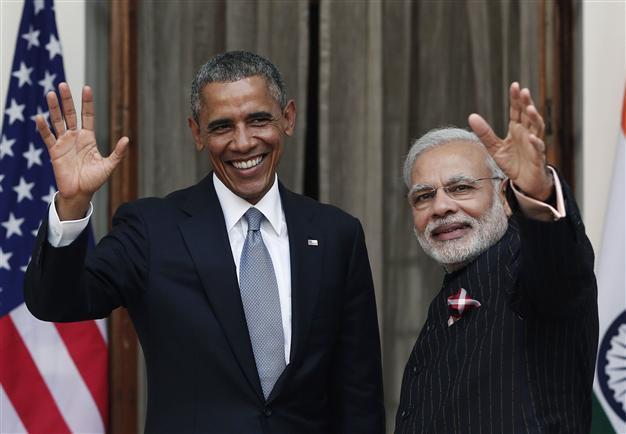Obama announces nuclear "breakthrough" on landmark India trip
NEW DELHI - Reuters

U.S. President Barak Obama and India's Prime Minister Narendra Modi (R) wave towards the media during a photo opportunity ahead of their meeting at Hyderabad House in New Delhi January 25, 2015. REUTERS Photo
In a glow of bonhomie, U.S. President Barack Obama and Indian Prime Minister Narendra Modi announced a breakthrough on nuclear trade on Jan. 25, a step that both sides hope will help establish an enduring strategic partnership.Obama said the two countries had made progress on two issues holding up commercial civil nuclear cooperation, one of the major irritants in bilateral ties.
"We are committed to moving towards full implementation," Obama told a joint news conference with Modi in the Indian capital. "This is an important step that shows how we can work together to elevate our relationship."
The agreement resolved differences over the liability of suppliers to India in the event of a nuclear accident and U.S. demands on tracking the whereabouts of material supplied to the country, U.S. ambassador to India Richard Verma told reporters.
"Ultimately it's up to the companies to go forward, but the two governments came to an understanding," he added.
Signalling his determination to take ties to a higher level, Modi broke with protocol to meet and bear-hug Obama as he landed in New Delhi earlier in the day. It was a remarkable spectacle given that, just a year ago, Modi was persona non grata in Washington and denied a visa to the United States.
After a working lunch that included kebabs made with lotus stem, figs and spices, the two leaders got down to talks to finalise agreements on climate change, renewable energy, taxation and defence cooperation.
But Modi cautioned that work was still needed to create a solid partnership between the world's two largest democracies.
"We have to convert a good start into lasting progress. This requires translating our vision into sustained action and concrete achievements," he said, standing next to Obama.
Earlier, the two leaders walked and talked together in an elegant garden and sat outside over tea. Modi, who sold tea on a railway platform as a child, poured a cup for Obama.
Obama will be the first U.S. president to attend India's Republic Day parade, an annual show of military might long associated with the anti-Americanism of the Cold War, and will host a radio show with Modi.
His presence at Monday's parade at Modi's personal invitation is the latest revival in a roller-coaster relationship between the two largest democracies that just a year ago was in tatters.
Armed police and soldiers lined the roads of New Delhi, where Obama was met with a guard of honour and a 21-gun salute in a formal ceremony at the presidential palace. Briefly, a stray dog ran around the forecourt of the palace in an otherwise highly choreographed event.
Up to 40,000 security personnel have been deployed for the visit and 15,000 new closed-circuit surveillance cameras have been installed in the capital, according to media reports.
New vitality
The United States views India as a vast market and potential counterweight to China's assertiveness in Asia, but frequently grows frustrated with the slow pace of economic reforms and unwillingness to side with Washington in international affairs.
Elected last May, Modi has injected a new vitality into the economy and foreign relations and, to Washington's delight, begun pushing back against China's growing presence in South Asia.
Annual bilateral trade of $100 billion is seen as vastly below potential and Washington wants it to grow fivefold.
Obama will depart slightly early from India to travel to Saudi Arabia following the death of King Abdullah, instead of a planned visit to the Taj Mahal.
Like Obama, Modi rose from a modest home to break into a political elite dominated by powerful families. Aides say the two men bonded in Washington in September when Obama took Modi to the memorial of Martin Luther King, whose rights struggle was inspired by India's Mahatma Gandhi.
The "chemistry" aides describe is striking because Modi's politics is considerably to the right of Obama's, and because he was banned from visiting the United States for nearly a decade after deadly Hindu-Muslim riots in a state he governed.
Obama, the first sitting U.S. president to visit India twice, also enjoyed a close friendship with Modi's predecessor Manmohan Singh, who in 2008 staked his premiership on a controversial deal that made India the sixth "legitimate" atomic power and marked a high point in Indo-U.S. relations.
The nuclear deal has so far failed to deliver on a promise of billions of dollars of business for U.S. companies because of India's reluctance to pass legislation shielding suppliers from liability, a deviation from international norms.
In a reminder that personal chemistry is not always enough, ties between Washington and India descended into bickering over protectionism that culminated in a fiery diplomatic spat in 2013 and the abrupt departure of the U.S. ambassador from New Delhi, who has only just been replaced.
















